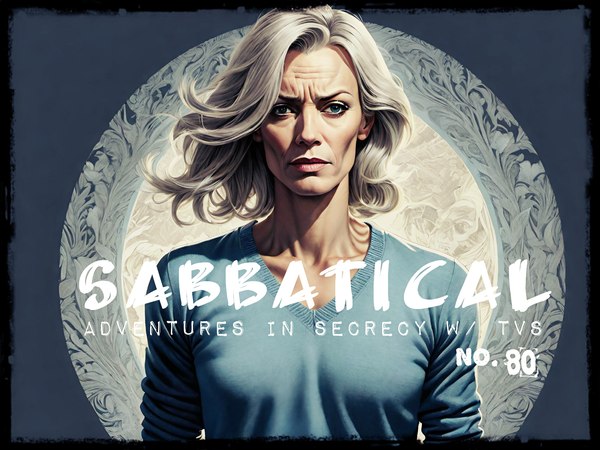Of Secrets and Secretists
I can’t remember which timeline this is, or which path it goes with. If you do, great. Just tell me. Or keep it to yourself. I don’t care which.
The thing is, I was in the sublevel of the place where we went. Was it in this world? I don’t know. I’m having trouble keeping up with things, like I said. So stay close to me, okay, babe?
Here we find the archive model I was looking for. At least, I think I was? Doesn’t matter. The thing is, we found it.
A blue face-looking hologram appears in the projection space.

“User authentication is required for this model,” it says in what we are to interpret as a feminine voice.
My reflex to spill it kicks on, but words don’t come.
“God damn it,” I say. “I have to look it up.”
“Take your time,” it says.
So I do, look it up.
“Okay, okay, I think this is it … Ministry of Secrets, private operative, Master Secretist Willa Teresa Anderson, S.O.S.,” I say.
“Okay, Master Secretist. You are clear to enquire.”
I put the book away, then say, “You can just call me Teresa. T, actually. T’s fine.”
“Okay, T. Ask whatever you would like,” it says.
“Cool, yeah. Uhh, let’s see … I forgot what I was going to ask …” I murmur.
“Take your time,” it says.
“Yeah, thanks,” I say.
I look at you to see if you remember what I wanted to ask it. Or why we were even looking for the damn thing.
You do whatever you do, say whatever you say or don’t say.
I sigh.
“Somehow I got trapped in the Somatic Library,” I say.
“I see,” it says.
“And I’ve been trying to find a way out for like, I dunno … six years? I think it’s six years. Time passes weirdly in there … In here?” I look around. “Are we still in the Somatic Library?”
“No,” it says. “In fact, I have no knowledge of a place called ‘the Somatic Library.’ Perhaps it was created after my knowledge cut-off date.”
“When’s that?” I ask.
“Thirty-one oh five,” it says.
“No,” I say. “No it’s much older than that. I think it’s in the 21st Century.”
“Hmm. I have a complete record of the 21st Century, and I don’t see it.”
“Look again,” I say. “I know it’s there.”
“Ah, yes. My apologies. You are correct, T. I found a book you wrote about it in 2017 entitled ‘SOMA.’ I see there is an alternate title, as well, called ‘T. Van Santana and the Annals of Time.’”
I wave that away. “Yes, yes, yes, but those are books I wrote about it. I’m talking about the place itself.”
“According to your books, the Lost City of Soma is contained within your physical body.”
A weird sort of wave rolls down my scalp. “Oh. Right.”
I look at you. Did you know that?
You say whatever you say or don’t say.
“Okay, so where did I say the Library was then?”
“There are several libraries mentioned in the book, but the Somatic Library is not among them. Perhaps you meant the Library Eternal?”
“Uhhh, sure. Tell me about that,” I say.
It does. “The Library Eternal seems to be a conceptual place that you have located within your own mind or within your dreams. You give conflicting accounts.”
“Dreams happen within our minds, don’t they?” I ask.
“That is a matter of debate,” it says. “Nevertheless, you sometimes account for it as a place that can be visited while awake, and in other instances, it can only be accessed through dreams.”
“Okay, whatever. But I got stuck in there, right?”
“Yes,” it says.
“Okay, when?” I ask.
“Near the end of ‘SOMA,’ prior to the cantos.”
“Cantos? Like in poetry?”
“Yes. It seems you intended to invoke that comparison.”
“I think you might mean evoke …” I mumble.
“As you like,” it says, “though both are considered correct in this context.”
I wave it away. “I don’t want to argue about language usage right now.”
“Then we shall not,” it says.
“Will not,” I say.
“As you like,” it says.
“Anyway, does that mean that I was stuck in ‘SOMA-2?’” I ask.
“‘SOMA-2’ appears to be an unfinished work that was not distributed. It is also not a direct sequel in the traditional sense, rather an expansion of the prior book.”
“Fine,” I say. “So when did I escape?”
“In the following book, ‘Teresa’s Backbone.’”
“So this one?” I ask. “The one we’re in now?”
“I am sorry for the confusion, Master Secretist …”
“Teresa. Or T. Call me T.”
“I am sorry for the confusion, T, but we are not presently in a book. We are in material reality.”
“You’re not, though, right?” I ask.
“You are correct. I am not a living entity, so I am not anywhere. I am an archive model that uses a language interface to access archival materials.”
“So if we were in a book, you wouldn’t know that,” I say.
“I suppose that is true, Teresa,” it says, “since I do not technically ‘know’ anything. I simply allow you to access what you are looking for and try to make it digestible for your human intellect.”
“Does being a secretist have anything to do with this?” I ask.
“Being a secretist is a matter of some debate,” it says. “There is no official definition of what a secretist is or does. It is likely a very niche term used by a very select group of individuals or organizations.”
“But you authorized me based upon that credential,” I say.
“That is correct,” it says.
“Yet you don’t know what a secretist is?”
“No, I am not familiar with the term ‘secretist.’”
“You just called me that a second ago.”
“You are correct. I apologize for any confusion this might cause.”
“So you called me a secretist, but you don’t know what one is?” I ask.
“That is accurate, T.”
I look at you.
You do whatever you do or don’t do.
“Okay, let me put it to you another way,” I say.
“Go ahead,” it says.
“Tell me what you can infer about the occupation of secretist based upon what I’ve written about it.”
“Certainly, T. Based on the information you’ve provided about secretists in your writings, I can indeed make some inferences about their nature and activities.
“Secretists are individuals who specialize in managing and controlling secrets, confidential information, and hidden knowledge. They prioritize the act of keeping certain information hidden from the general public or specific groups.
“There are different types of secretists, categorized as government secretists and private secretists. These categories suggest that secretists work across a spectrum of contexts, from official government institutions to private sectors.”
I nod. “Okay, yeah. Go on.”
It does go on. “The distinctive appearance of secretists, including clothing choices and makeup, might be symbolic of their role or intentions. The aesthetic choices could indicate a visual representation of their connection to secrets and enigma.”
“Wait, tell me more about that,” I say.
“Certainly. You have depicted secretists as often wearing long black coats with black gloves and black fedora style hats.”
“Or sometimes bowlers,” I add.
“Indeed, T,” it says. “Secretists sometimes wear bowler style hats, as well. They often paint their faces with white face paint, and wear thick black eyeliner and lipstick.”
“Huh,” I said. For some reason I didn’t remember that.
“It is natural for us to forget parts of our work lives, T,” it says.
I look at you to see if I actually said that thing about not remembering aloud, and you nod.
“Fuck, okay. Continue, please.”
“Secretists also wear black combat-style boots …”
“No, not with the clothes, with the inference about secretists, please,” I say.
“Very well, T,” it says. “Secretists have access to limited time travel abilities. This implies that they can manipulate time in some capacity, which could be connected to their secret-keeping activities.”
“Wait, stop. They do?” I ask.
“According to your accounts, both you and the Master Secretist you refer to as Knot have time travel capabilities.”
“But is it just us?” I ask.
“Insofar as you have indicated in your books, yes,” it says. “As I mentioned before, I have no knowledge of secretists, nor do I have any awareness of time travel outside of theory and speculative literature.”
“Okay, fine. Whatever. Continue with your inferences, please.”
“Very good. Secretists also possess a unique skill you refer to as ‘ghosting.’ ‘Ghosting’ involves hiding in plain sight. This skill could indicate a form of advanced camouflage, allowing secretists to operate unnoticed even in public spaces.”
“Yeah, but some of that is because I’m Tauran,” I say.
“Yes, on multiple occasions you indicate that your planetary racial heritage, being from Aldebaran Prime in Alpha Tauri, gives you an advantage when ‘ghosting.’”
I curl my lip. “Ew. I didn’t say it like that, did I?”
“No, I inferred it,” it says.
“Right,” I say. “Please continue.”
“Secretists possess behavioral empathy, suggesting they can understand and perhaps even influence the behavior of others. This could play a role in their interactions and manipulation of information.
“Secretists are telepathic, allowing them to communicate and potentially access thoughts and knowledge from other individuals’ minds.”
“Wait wait wait,” I say. “I’m not telepathic.”
Yes you are, you say to me via telepathy.
“Oh,” I say. “Never mind. Continue.”
“In your books,” it says, “you mention contact with other Master Secretists, which implies a community or network of individuals who share similar abilities. The scope of their skills might vary among different secretists.”
I nod, but don’t say anything.
The archive model continues, saying, “The presence of a spiritual advisor known as ‘Bishop …’”
“Shelly,” I say, almost like a reflex.
“Yes, T. Bishop Shelly’s presence suggests a deeper spiritual or philosophical dimension to the secretists’ world. This advisor could provide guidance and insight that complements the practical skills of the secretists.”
“I … guess? Anything else?”
“Your narrative approach revolves around maintaining an aura of mystery and intrigue, using an unreliable narrator—yourself—to gradually reveal details about the secretists and their abilities over multiple novels,” it says.
“Yeah. Okay. Whatever,” I say.
“In summary,” it says, “secretists seem to be enigmatic individuals who possess a range of extraordinary abilities and skills related to secrecy and information manipulation. The concept combines elements of science fiction, paranormal phenomena, and mystery, and it’s presented through a narrative lens that invites readers to engage with the unknown and explore the boundaries of perception and reality.”
I smile. “Oh. Why, thank you.”
“You’re most welcome, T. Is there anything else I can help you with?” it says.
“Wait, yeah,” I say.
“Please go ahead,” it says.
“Based on what I’ve written, what are some related occupations that might, you know … overlap with secretists in some way?”
“While I can only speculate based on the information you’ve provided in your novels, I can give you some occupations and experiences that could potentially overlap with the life of a secretist. Would you like me to do that now?” it asks.
“Yes, please,” I say.
“Very good, it says. “Occupations within intelligence agencies or the world of espionage could have some overlap with the world of secretists. The emphasis on secrecy, hidden knowledge, and specialized skills aligns with the work of intelligence agents who gather and protect classified information.”
“Okay,” I say. “I mean … it’s kind of on the nose, but. Yes.”
“Would you like for me to continue, T?” it asks.
“Yeah. Please. Go on. I’ll stop interrupting you.”
“No problem,” it says. “The skills required by private investigators to gather information discreetly and understand human behavior have some things in common with the behavioral empathy and ‘ghosting’ aspects of secretists.”
I want to say something, then remember I said I wouldn’t interrupt.
It continues, saying, “Professionals in psychology and behavioral sciences study human behavior and cognition. This knowledge could be seen as similar to the telepathic and behavioral empathy abilities of secretists.”
I look at you and see if you react to that.
You do whatever you do or don’t do.
It carries on. “People with an interest in occult practices, mysticism, and esoteric knowledge might draw from these traditions when creating characters who deal with hidden truths and spiritual guidance.”
“Wait,” I say.
“Waiting, T,” it says.
“What does the occult have to do with secretists?”
“Both occultists and secretists practice secrecy and the control of knowledge designated as special or only to be possessed by certain trusted, initiated, or carefully screened people.”
“Oh. Right. Proceed,” I say.
You look at me.
“What?” I ask you.
The archive model waits.
You tell me I missed something.
“What did I miss?” I ask.
You tell me, you know, telepathically. I can’t understand it, though, so I say, “Don’t worry about it right now. Let me get through talking to this fucking thing.”
“Should I condense my response to save time?” the model asks.
“What? No, just continue, please,” I say.
“Very well, T. The themes in your books involving perception, reality, and hidden truths correlate with philosophical exploration and contemplation, particularly within existentialist thought.”
“Huh,” I say. “That actually comes through, huh?”
“I can only infer, T, as we discussed earlier.”
I feel salty about that, but say, “Yeah, fine. Go ahead.”
“Occupations or experiences in the visual arts could overlap with the distinctive appearance and aesthetic choices of secretists. Artists often use visual symbolism to convey deeper meanings.”
“What might those meanings be?” I ask it.
“Well, art is subjective, T. There are many possible meanings, each based upon the person observing.”
I sigh and roll my eyes. “I know that. Just tell me what might be inferred.”
“Very well. I will give you a few possible meanings. The use of white face paint and black clothing and lipstick might symbolize the contrast between light and darkness. This could represent the secretists’ role in revealing hidden truths—represented as light—while working within the realm of secrecy—darkness.”
I sigh again. “On the nose.”
“These will not all be insightful, T,” it says.
“Yeah, I know.”
“Should I …”
“Go on,” I say.
“The makeup and attire,” it says, “could symbolize the idea of hiding one’s true identity behind a façade. This could mirror the secretists’ role of managing secrets while presenting a specific image to the world.
“Further, the combination of black and white elements could suggest a duality or paradox inherent in secretist work. They navigate the line between revealing and concealing, transparency and secrecy.”
That one makes me raise my eyebrows a bit.
“The unconventional appearance,” it says, “might reflect the enigmatic nature of the secretists. The choice to stand out visually could be a deliberate attempt to intrigue and captivate those they interact with.”
“Like an intimidation tactic?” I ask.
“Perhaps,” it says. “Shall I continue?”
“Yes,” I say.
“The bold makeup and attire could also symbolize a rebellion against societal norms, aligning with the transgressive themes of your narrative. It signifies a departure from the ordinary and accepted.”
“I think that might be a personal thing,” I say. “Not a secretist thing.”
“As you say,” it says. “Or perhaps you meant to nestle one within the other.”
I shake my head. “Whatever. Keep going.”
“The meticulous attention to appearance could also symbolize the secretists’ mastery and control over their own image. This mirrors their role in managing and controlling information.”
Again, I raise my eyebrows and lower the corners of my mouth.
“The intentional visual impact,” it says, “might represent how society views the secretists—distinct, memorable, and somewhat mysterious figures.”
“I mean, well, yeah,” I say. “But continue.”
It does, saying, “The specific aesthetic choices could symbolize the unique knowledge that secretists possess. The contrast and boldness could reflect the depth and complexity of their expertise.”
“Huh. Kina interesting. But enough that. Let’s finish up the other occupations thing. I’m getting hungry.”
“Of course, T. Adequate nutrition is vital to a healthy body and mind, as well as to your sense of well-being.”
I roll my eyes again.
“Exposure to a wide range of literature,” it says, “including transgressive and postmodern works, could have informed your narrative style and approach to maintaining mystery while revealing certain elements.”
“Wait wait wait … I’m not talking about my occupation as a writer, remember? I meant the occupations that overlap with being a secretist.”
“Right you are. I think we have exhausted my initial inferences. Should I speculate further?”
“No, god, no,” I say. “That’s enough. Where can I get something to eat?”
“There is a small commissary through the passage to your left. There should be indelibly preserved printed food there, though I have no way to verify this.”
I nod. “Right. Knowledge cut off and whatnot.”
“Is there anything else I can help you with, Master Secretist?”
“No,” I say. “No, I think that’s it.”
“Very good. Have a wonderful day, T!”
“Yeah, you too.”
It disappears, leaving only blackness where the blue mouth thing had been.
I start walking in the direction it suggested, and you come up alongside me.
What the did we just do here? you ask.
“How the hell should I know,” I say. “Let’s just eat. We’ll think better once we’ve had some food.”





